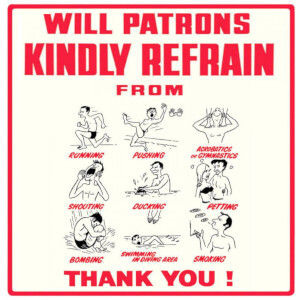


Why do Christians make up rules?
I don't know who first said “Dem's da rules” but I reckon it was probably someone religious! Christians love rules. If there's not a rule about something, we'll make it up. The Bible has got no rules about cinemas or dancing or smoking, so we made some up. It's got no rules about Sundays so we reapplied some handy Saturday rules. Rules are about control, and that's why many Christian denominations love rules.
For many years, I never understood Paul's letter to the Galatians. The letter is crystal clear about Christians and the law. But because I had been soaked in traditional Christian thinking for 35 years, I simply couldn't understand it. There Paul says we are “not under Law”, by which he is referring to the entire Old Testament law, as evidenced by his working example. He doesn't pick a local food law, or geographically specific health law, but he picks the most culturally transportable, the most widely applicable law out of the Ten Commandments. YOU SHALL NOT COVET.
Wriggle as you like, you simply cannot get away from the fact that the entirety of Galatians, and large chunks of Romans unequivocally states that the Law – the Ten Commandments included – does not apply to us. Paul makes that clear, not only by his choice of example, but by his reference to “tablets of stone”. Only the Ten Commandments, you will recall, were inscribed in stone.
Lets have a whistle-stop tour of Galatians. In Chapter One, after a very brief introductory paragraph Paul launches straight into his theme. He writes …
And he underlines the fact that the gospel Paul preached, he received by direct revelation from God, which was subsequently ratified by Peter. We can see from Paul's words that he is really hot under the collar - evidently some were preaching something extremely dangerous to the newly establishing church.
In Chapter Two, Paul writes that some of his Christian contemporaries were very suspicious about his freedom in Christ. They wanted his newly converted Gentile friends to be circumcised. But the issue wasn't circumcision per se. It was what it symbolised – adherance to the Old Deal - the Law. That quickly becomes clear when Paul moves on to talk about the foolishness of obeying the Old Testament Law concerning what to eat.
Chapter Three begins with the most cutting indictment that Paul ever writes.
I think Paul is a bit tough on these new Christians here. To want to follow rules is deeply woven in our psyche. Paul makes it clear again in the first half of this chapter that it is utter folly to rely on observing the law. And you can well understand why Paul was accused of heresy, by those Jews who were more used to hearing David's “Oh how I love your law”, when Paul says …
Then following a brief history lesson, Paul says …
Then finally at the end of the chapter, Paul introduces his first illustration, by saying …
So in Chapter Four, we find Paul contrasting family relationships with professional relationships. The contrast cited is that of the son versus the slave. Sons, says Paul, have a relationship with “Dad” - (probably the best translation for Abba in modern English). Sons have the breath of the father in their lungs. They share his very life. Sons get to share all the family wealth. The full rights of sons mean they inherit it all. (Apologies to 21st century daughters – but Paul lived in different times!)
Paul then says that the slave, is like Mount Sinai (the place where the Old Testament law was given), and they both equate to the old Jerusalem; bound to the Ten Commandments and the Old Testament law.
But sons (let me use the word children, because in our society both sons and daughters have equal inheritance rights) … but children, says Paul, are FREE. Free from the law. Free from rules.
In Chapter Five, Paul makes it clear that Christians should not place themselves back under the authority of the Ten Commandments and the Law. He knows that his hearers, like some of us, begin to feel very uncomfortable with this total freedom.
We want to say 'principles are good, aren't they?' 'Surely we need some guidelines.'
Beware, says Paul, of wanting a little bit of law. It will sneak in and infect your whole Christian life – like yeast in a loaf.
Now we come to a very familiar part of Galatians – the fruit of the Spirit. But note the context, in the light of all that Paul has said.
He firstly writes …
… Paul is saying that you don't need the law to tell you to avoid this stuff.
Then he writes …
… Paul is saying that you don't need the law to tell you this is the stuff you want. Maybe you've wondered, in the past, why Paul says 'against such things there is no law'. Well now you know!
You may be thinking, wait a minute … are you saying we can behave however we want to? Surely Paul is not saying that morality doesn't matter. Surely there must be some lines drawn somewhere.
That's why Paul is so strong in Galatians about the work of the Spirit. Those breathing in and depending on the life-breath of Abba – Dad, just know what is right and what is wrong.
In Chapter Six, Paul makes it clear that of course sin and morality, temptation and testing and obedience are all still relevant for us, even though we are not under the authority of Old Testament law. He harks back to Jesus' own words. Carry each others burdens. Love each other. Never tire of doing good.
Because that's what Dad does, and that's how it is in our family.

